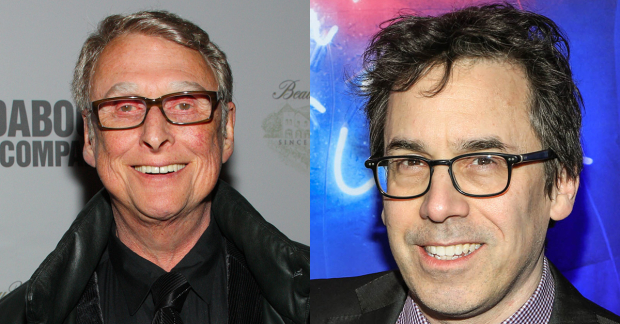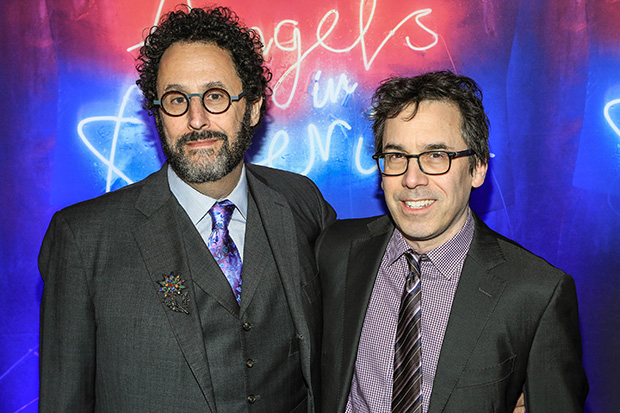Interview: Mark Harris on Unlocking the Key to Mike Nichols in His New Biography
Harris’s new book, ”Mike Nichols: A Life”, is available now.
Journalist Mark Harris first encountered Mike Nichols when Nichols signed on to direct an HBO miniseries adaptation of Angels in America, written by Harris's husband, Tony Kushner.
Nichols, at the time, was in the prosperous late period of a career that had rocketed to the highest peaks early on and sunk to the lowest depths during a meandering mid-period. As a performer, Nichols had become famous overnight with comedy partner Elaine May. As a stage director and producer, he cumulatively won nine Tony Awards, notably for shows like The Odd Couple, Annie, Spamalot, and Death of a Salesman. Onscreen, Nichols broke new ground with his films Who's Afraid of Virginia Woolf?, The Graduate (which earned him an Oscar), Carnal Knowledge, and The Birdcage.
The making of The Graduate was partially the subject of Harris's 2008 book Pictures at a Revolution: Five Movies and the Birth of the New Hollywood. Following Nichols's death at 83 in 2014, Harris began pursuing the idea of a biography. The miraculous result, Mike Nichols: A Life, is now available from Penguin Random House.
Here, Harris tells us about the work it took to delve into Nichols's storied life, and how unlocking a key personal fact changed the course of his reportage.
Buy Mike Nichols: A Life here.

(© Tristan Fuge/Tricia Baron)
This interview has been condensed and edited for clarity.
Until I read the book, I don't think I ever really completely understood how extraordinarily influential Mike Nichols was in so many mediums.
It's a three-part story, isn't it? It's him as a movie director, it's him as a theater director during the same years, but it's also him as a performer. One of the many things I didn't fully understand when I started this was how much the comedy he did with Elaine May — specifically observational comedy and showing an audience to itself through the characters he was playing — would inform the way he worked as a director. Like a lot of people, I thought of performing as a separate career he had before he was a director. But in doing the research, I really came to understand how deeply, certainly his theater work, but even his movie work, was informed by his years with Elaine, and particularly by that eight or nine months they spent together on Broadway.
I also never really thought the idea of becoming an "overnight sensation" was real until I read the sections about how Mike and Elaine literally got famous overnight with their early club act.
That's the kind of statement, as a journalist, that you're trained to regard skeptically. It's a cliché, and it doesn't really comport with the way I understand fame to happen. But in investigating that and reading things that Mike or Elaine or [manager] Jack Rollins said about becoming stars overnight, it really opened up my mind to the idea that it really was possible back in 1958 to become famous overnight. It was a really different world.
One of the things I really loved about the book is how, at times, it also feels like a biography of the well-known elusive figure that is Elaine May.
I really hope that's true. I don't see Elaine May as just some interesting supporting character in Mike's life. She was defining for him in many ways. Not only was their partnership this essential part of the history of comedy, but…Mike was one of the few movie directors of his generation who was very, very comfortable working with women, whether that was Ann Roth, the great costume designer, or Nora Ephron or Meryl Streep or Emma Thompson or Patrizia von Brandenstein, his production designer. Mike was not threatened by women and looked at them as collaborators in ways that his male peers did not at that time, and I think that is absolutely intertwined with the fact that the formative creative influence of his 20s was a woman.
There was a minor media sensation a few years ago when a biography about Mike's best friend, the photographer Richard Avedon, was written by Avedon's longtime studio director, and it detailed a decade-long romantic relationship they had. You couldn't seem to corroborate that story, and you detail your process extensively in one of the book's few footnotes. Can you talk about that process?
I wanted it to be right on the page when you're reading, because I knew that it was something that people would be curious about. Writing about homosexuality or bisexuality in a biography is always complicated, because on one side, there are people who will say, "I don't need to know about that," and on the other side, you encounter people who are really invested in it being the thing that explains everything, which is also not the case. As I say in the note, if I had found anything of substance that was reportable, I wouldn't have thought for a second about excluding it, but I also felt that I had to hold it to the same standard as everything else, meaning, are there names attached? Do I have sources? Does this make sense given the circumstances?
It both did make sense to me, because there is absolutely no question about the extreme closeness of their relationship, which Mike has talked about himself, and there were things that didn't make sense to me, specifically the timeline that was suggested, the language that was attributed to Avedon, and the fact that Mike was interviewed for that book and quoted extensively in it and was apparently never asked about it. I had a brief chat with Avedon's biographer, Philip Gefter, who is not the author of that book, and we felt each other out to see if either of us had found anything, which we hadn't.
What was the most enlightening aspect of Mike's life that you learned over the course of this process?
What I did not know was how much depression had been a part of his life, and how much he worked to stay connected to the world and his creative self in spite of that. I was pretty deep into research before I started to realize that that was a pattern, and it changed the course of my reporting the book a little bit. It became something I started to ask people about, and in a few cases, I went back to people I had interviewed already and asked if we could talk about it.
In a number of cases, there were people who said, "Oh yeah, depression was a big part of Mike's life." Understanding that as something that really was intrinsic to him for many decades helped me in many ways with the larger question that I was struggling with all the way through, which was…All I wanted was to be able to make sense of his life and his decisions for myself. The thing I feared most when I was working on the book was that I would come upon a movie or a play or a decade when I just wouldn't be able to understand why he was doing what he was doing. Understanding that depression was an element of his life really helped me clarify certain things.
You and Mike were real-life acquaintances through his last decade or so; he famously directed the screen version of Angels in America, written by your husband. How did you separate your personal ties to him with the journalistic removal you need to write something like that?
I think the most honest answer I can give you is, how to separate those two things wasn't something I had completely figured out when I started work. I knew it was going to be an issue and figured I'd navigate it to a degree as I go. Certainly, I went into the book knowing that it wasn't going to be a personal memoir, obviously, of me knowing Mike. When push came to shove, the journalist side of me would win.
I never would have gone into the book if I had thought I might find out certain things I will have to leave out because they might be unflattering. I went in assuming, correctly as it turned out, that what I knew about Mike was not nearly as much as what I didn't know about Mike. My feeling was that anything I found out, positive or negative, would contribute to a full picture of Mike, and therefore I didn't even really categorize it in my head as positive or negative. It's all useful in trying to understand who he is.

(© Tricia Baron)







